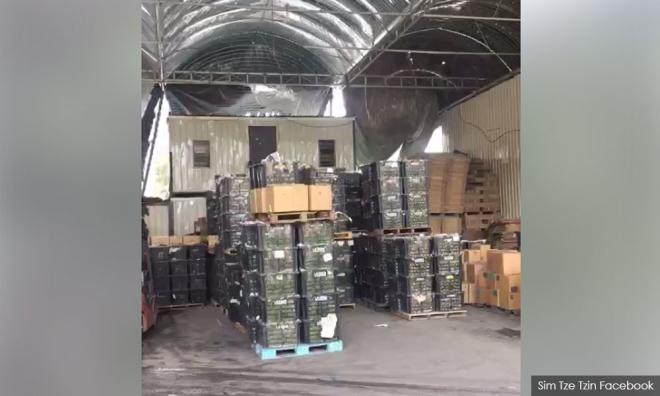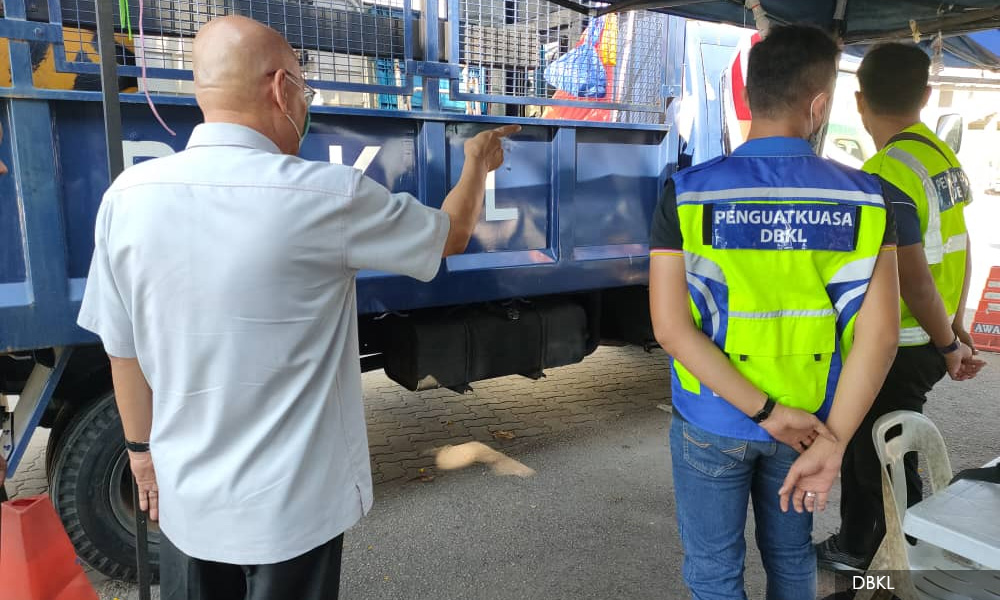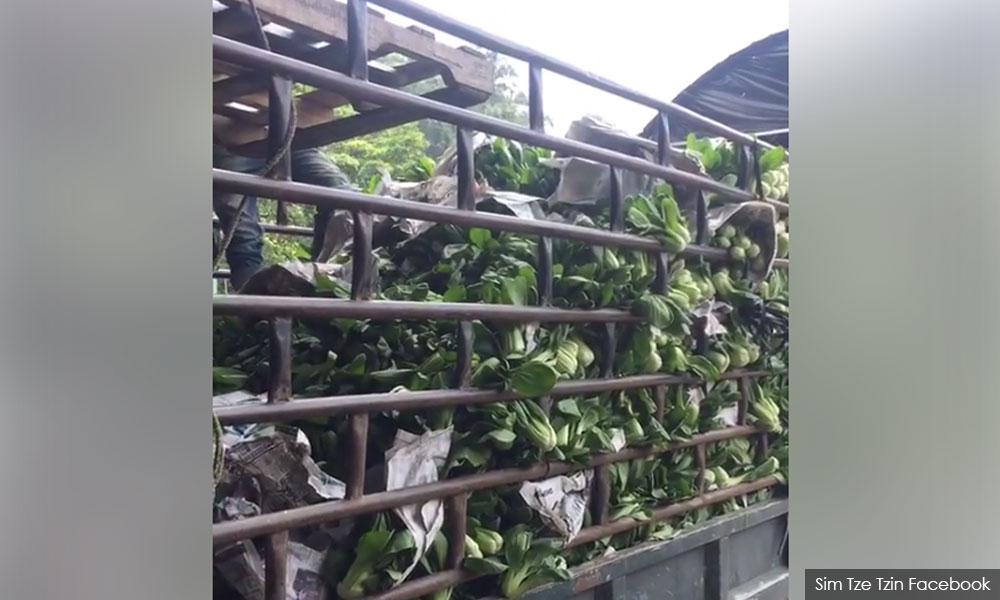
CORONAVIRUS | Restrictions on traffic and market operating hours under the movement control order (MCO) have adversely affected the supply chain for vegetables and raw food.
Due to the various problems and regulations imposed by authorities, many vegetable sellers and vegetable delivery truck drivers said they would rather stop their service to avoid problems.
The Kuala Lumpur Wholesale Market is among the worst affected.
According to Wong Keng Fatt of the Kuala Lumpur Vegetable Wholesalers’ Association, some 50 percent of vegetable stalls have closed after the Kuala Lumpur City Hall mandated that only two foreign workers are allowed to work during the market’s operation hours.
Wong said the market is the centre for vegetable distribution in the capital city with 448 stalls.
Some 5,000 people would normally work at the market on a regular day, but now, less than 1,000 are present since the MCO was imposed, Wong told Malaysiakini.
‘Lives more important than business’
Some 80 percent of vegetable stalls rely on foreign labour, thus many stalls will close beginning today due to labour shortages.
“Many of my members complained that they used to have seven or eight people running each stall, but with two people, it’s difficult. There are not enough people to unload vegetables from lorries,” he said.
Under the order, Wong said about 40 percent of wet markets in Kuala Lumpur have closed, but the supply of vegetables is still adequate and there’s even an oversupply, resulting in nearly 30 percent of vegetables being discarded each day at the wholesale market.
Despite these difficulties, Wong said the wholesale market will continue operations even though traders will rake up huge losses because it is the association’s social responsibility.
“Not being able to do business is a small matter, human lives are more important. Now that the Covid-19 pandemic is so serious, we must cooperate with the government and stay at home as much as possible.
“However, since so many rules and conditions are being imposed, many could not adapt. But all this is understandable since it is for the greater good,” Wong said.

In an effort to observe the new ruling of the Kuala Lumpur City Hall (DBKL), the association has notified its members that while there is no restriction of the numbers of local workers, but only two foreign workers are allowed to work and they have to wear a green shirt with a jacket.
Under the new ruling, they can only operate from 10am to 7pm and 12am to 7am. The Pasar Borong Kuala Lumpur used to work 24/7.
The closure of markets and the lack of staff at the wholesale markets have also impacted the upstream industry, for example, the farmers and transport industry in Cameron Highlands.
Cameron Highlands is the country’s main producer of vegetables, chiefly cabbage, with an output of 68,500 metric tonnes grown over 2,770ha, according to a report in June 2019.
It was reported less than half a million hectares of land in the country is used for planting agro-food crops such as fruits and vegetables, and for livestock.
There are viral video clips on social media showing operators lamenting their plight of being forced to dispose of their vegetable produce.
Cameron Highlands Agricultural Entrepreneur Organisation chairperson Chai Yee Meng said the issue of dumping fresh vegetables is just the beginning and many have raised concern that the situation will worsen.
"This is not the full picture yet... the demand for vegetables has dropped following the MCO as people rarely come out (to buy food now).
"It is difficult for the lorry to deliver goods.... when you have one passenger and lots of items (to unload), then you will be blocked. It is hard.
"But the issue has been dealt with by DBKL. (We are) just worried that (the situation) will get more and more difficult," he said.
An operator who delivers vegetables from Cameron Highlands, who refused to be named, said hundreds of tonne of vegetables have been dumped due to the closure of the markets.

There were more than 100 lorries sending 10 tonnes of vegetable produce each to Pasar Borong Kuala Lumpur on a daily basis. But since the MCO, the vegetables were held up at Cameron Highlands and ultimately disposed of.
"We considered giving the vegetables away for free but this resulted in mass gatherings where many came to grab the produce, so we were forced to dump them," he said.
Cameron Highlands Vegetable Transport Vehicle Owners’ Association chairperson Kwang Ee Fu said the delivery of vegetable is listed as an essential service and they are allowed to operate as usual.
However, drivers were being stopped and questioned at roadblocks, making them anxious, he said.
"Many questions are being asked (when they get stopped by police), including to show our permit and letter from the company, but we are free to go at the end," he said.
But some lorries are denied entry once they arrive at the wholesale market, he added.
"These are technical issues. (We) hope that DBKL and the police can resolve them in a better way," he said.
Vegetable supply to wholesale markets reduced
Cameron Highlands farmer Ng Tien Khuan said some wholesalers have already asked him not to send his vegetables for the time being.
He noted the vegetable supply for supermarkets has continued as usual but the demand for the operator at the markets has reduced.
"Vegetable supply comes daily. If we stop one day, then there will be a stockpile the following day and that leads to oversupply," he said.
"The supply reduction at the wholesale market will affect the supply to the small market and ultimately the buyers will face a problem in getting the vegetables," he said.

Meanwhile, Tanah Rata state assemblyperson Chiong Yoke Kong (above) said the disruption of logistic services especially the supply of vegetables from Cameron Highlands, may affect the stability of food supply.
In a statement yesterday, he suggested the Federal Agricultural Marketing Authority (Fama) collect excess and unsold agriculture produce held at the upstream.
"Secondly, the National Disaster Management Agency (Nadma) can coordinate government agencies to distribute the produce to the needy," he said.
"I sincerely hope that the National Security Council and Prime Minister Muhyiddin Yassin can consider the proposals," he said.
Kuala Lumpur police chief Mazlam Lazim was quoted as saying yesterday that the police suggested that Pasar Borong Kuala Lumpur reduce its operation hours and manpower in accordance with the MCO which will end on March 31. - Mkini



No comments:
Post a Comment
Note: Only a member of this blog may post a comment.